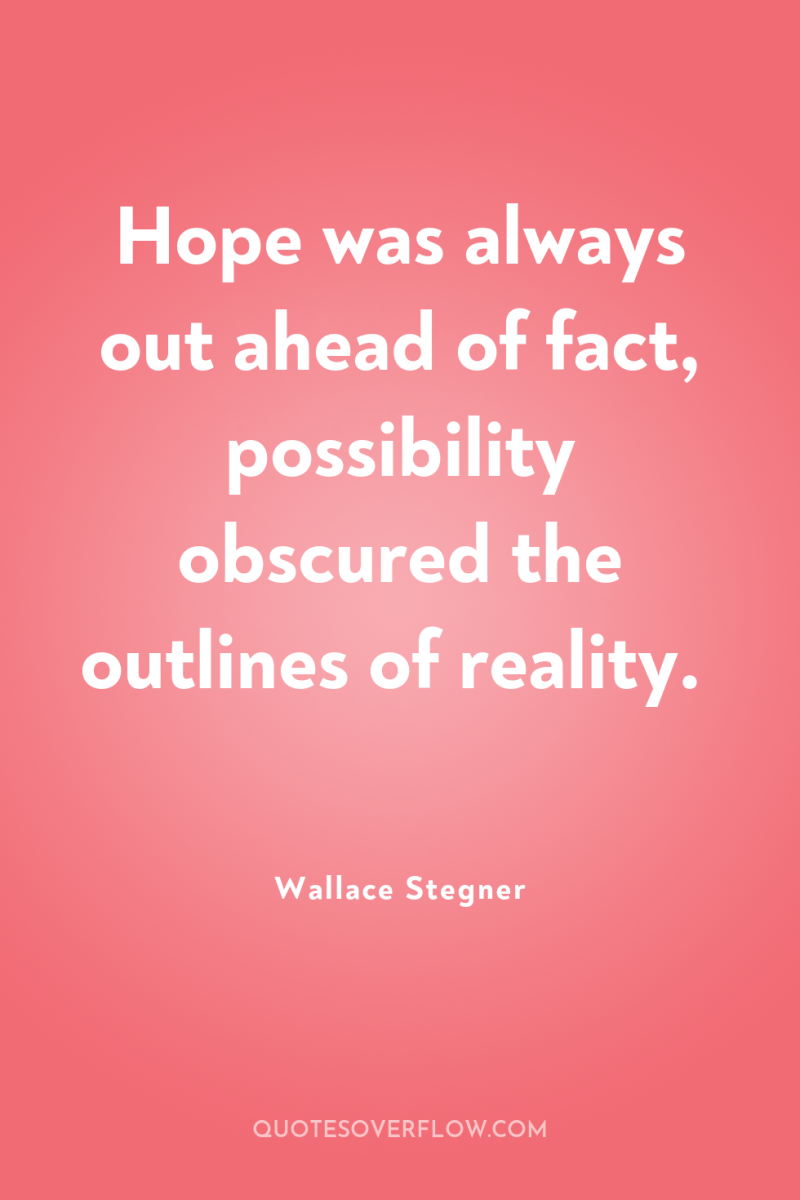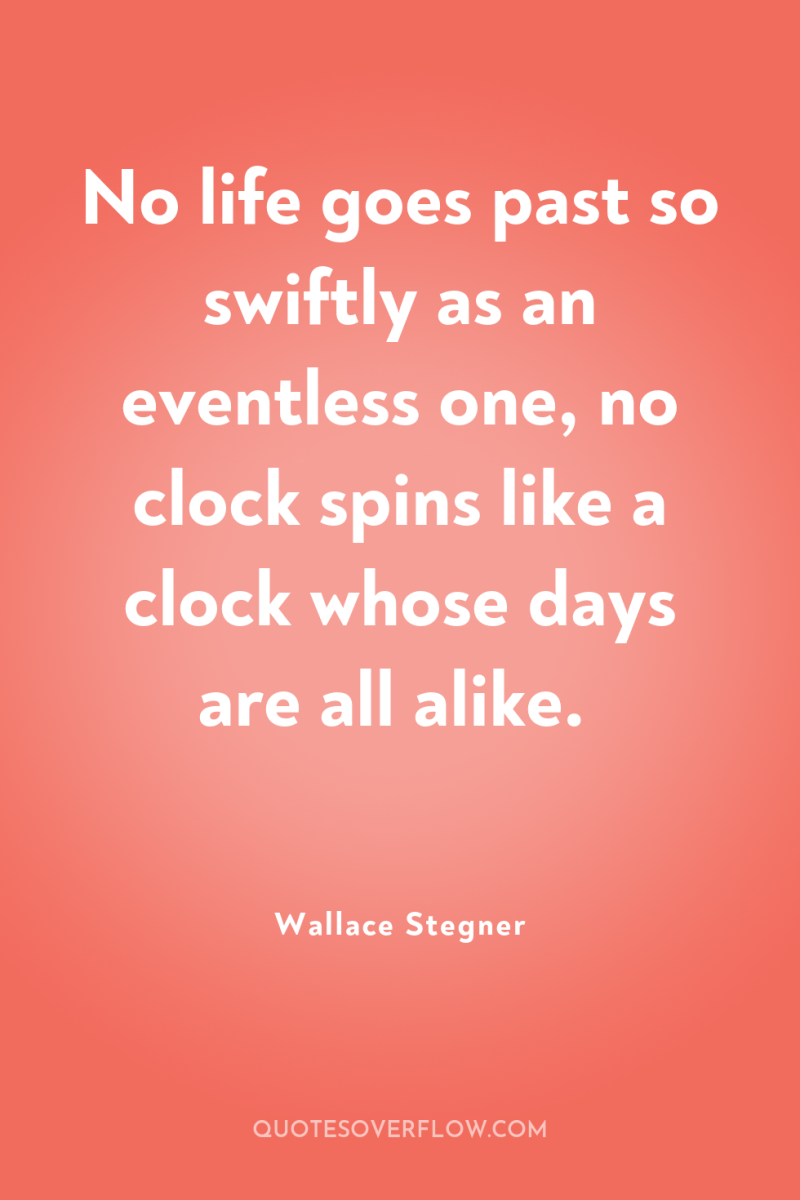
1
Wisdom.. .is knowing what you have to accept.Wallace Stegner
2
There must be some other possibility than death or lifelong penance .. some meeting, some intersection of lines; and some cowardly, hopeful geometer in my brain tells me it is the angle at which two lines prop each other up, the leaning-together from the vertical which produces the false arch. For lack of a keystone, the false arch may be as much as one can expect in this life. Only the very lucky discover the keystone. .Wallace Stegner

3
Hope was always out ahead of fact, possibility obscured the outlines of reality.Wallace Stegner

4
It's easier to die than to move ... at least for the Other Side you don't need trunks.Wallace Stegner
5
That night she wrote a hasty sketch and showed it to Oliver. "It's all right, " he said. "But I'd take out that stuff about Olympian mountains and the Stygian caverns of the mine. That's about used up, I should think.Wallace Stegner

6
No life goes past so swiftly as an eventless one, no clock spins like a clock whose days are all alike.Wallace Stegner
7
Civilizations grow by agreements and accomodations and accretions, not by repudiations. The rebels and the revolutionaries are only eddies, they keep the stream from getting stagnant but they get swept down and absorbed, they're a side issue. Quiet desperation is another name for the human condition. If revolutionaries would learn that they can't remodel society by day after tomorrow -- haven't the wisdom to and shouldn't be permitted to -- I'd have more respect for them .. Civilizations grow and change and decline -- they aren't remade.Wallace Stegner
8
There is some history that I want not to have happened. I resist the consequences of being Nemesis.Wallace Stegner
9
[The modern age] knows nothing about isolation and nothing about silence. In our quietest and loneliest hour the automatic ice-maker in the refrigerator will cluck and drop an ice cube, the automatic dishwasher will sigh through its changes, a plane will drone over, the nearest freeway will vibrate the air. Red and white lights will pass in the sky, lights will shine along highways and glance off windows. There is always a radio that can be turned to some all-night station, or a television set to turn artificial moonlight into the flickering images of the late show. We can put on a turntable whatever consolation we most respond to, Mozart or Copland or the Grateful Dead.Wallace Stegner
10
[Y]ou were too alert to the figurative possibilities of words not to see the phrase [angle of repose] as descriptive of human as well as detrital rest. As you said, it was too good for mere dirt; you tried to apply it to your own wandering and uneasy life ... I wonder if you ever reached it.Wallace Stegner
11
What do you mean, 'Angle of Repose?' she asked me when I dreamed we were talking about Grandmother's life, and I said it was the angle at which a man or woman finally lies down. I suppose it is; and yet. . I thought when I began, and still think, that there was another angle in all those years when she was growing old and older and very old, and Grandfather was matching her year for year, a separate line that did not intersect with hers. They were vertical people, they lived by pride, and it is only by the ocular illusion of perspective that they can be said to have met. But he had not been dead two months when she lay down and died too, and that may indicate that at that absolute vanishing point they did intersect. They had intersected for years, for more than he especially would ever admit.Wallace Stegner
12
[I]t is dangerous for a bride to be apologetic about her husband.Wallace Stegner
13
You can't retire to weakness -- you've got to learn to control strength.Wallace Stegner
14
I wouldn't live in a colony like that, myself, for a thousand dollars an hour. I wouldn't want it next door. I'm not too happy it's within ten miles. Why? Because their soft-headedness irritates me. Because their beautiful thinking ignores both history and human nature. Because they'd spoil my thing with their thing. Because I don't think any of them is wise enough to play God and create a human society. Look. I like privacy, I don't like crowds, I don't like noise, I don't like anarchy, I don't even like discussion all that much. I prefer study, which is very different from meditation-not better, different. I don't like children who are part of the wild life. So are polecats and rats and other sorts of hostile and untrained vermin. I want to make a distinction between civilization and the wild life. I want a society that will protect the wild life without confusing itself with it.Wallace Stegner
15
I would like to hear your life as you heard it, coming at you, instead of hearing it as I do, a sober sound of expectations reduced, desires blunted, hopes deferred or abandoned, chances lost, defeats accepted, griefs borne. I don't find your life uninteresting, as Rodman does. I would like to hear it as it sounded while it was passing. Having no future of my own, why shouldn't I look forward to yours. .Wallace Stegner
16
Salt is added to dried rose petals with the perfume and spices, when we store them away in covered jars, the summers of our past.Wallace Stegner
17
What interests me in all these papers is not Susan Burling Ward, the novelist and illustrator, and not Oliver Ward the engineer, and not the West they spend their lives in. What really interests me is how two such unlike particles clung together, and under what strains, rolling downhill into their future until they reached the angle of repose where I knew them. That's where the interest is. That's where the meaning will be if I find any. .Wallace Stegner
18
I am deep in my willed habits. From the outside, I suppose I look like an unoccupied house with one unconvincing night-light left on. Any burglar could look through my curtains and conclude I am empty. But he would be mistaken. Under that one light unstirred by movement or shadows there is a man at work, and as long as I am at work I am not a candidate for Menlo Park, or that terminal facility they cynically call a convalescent hospital, or a pine box. My habits and the unchanging season sustain me. Evil is what questions and disrupts. .Wallace Stegner
19
I never learned to say shit before a lady. I don't believe in progress in quite the way you seem to. You believe in it more than Grandmother did. As for those purely cultural patterns of convention you think I ought to escape from, they happen to add up to civilization, and I'd rather be civilized than tribal or uncouth.Wallace Stegner
20
Towns are like people. Old ones often have character, the new ones are interchangeable.Wallace Stegner
21
Home is a notion that only nations of the homeless fully appreciate and only the uprooted comprehend.Wallace Stegner
22
I wonder if ever again Americans can have that experience of returning to a home place so intimately known, profoundly felt, deeply loved, and absolutely submitted to? It is not quite true that you can't go home again. I have done it, coming back here. But it gets less likely. We have had too many divorces, we have consumed too much transportation, we have lived too shallowly in too many places.Wallace Stegner
23
It would be easy to call it quits. Occasionally I have these moments, not often. There is nothing to do but sit still until they pass. Tantrums and passions I don't need, endurance is what I need. I have found that it is even possible to take a certain pleasure out of submission to necessity. That have I borne, this can I bear also.Wallace Stegner
24
The moderns, carrying little baggage of the kind that Shelly called "merely cultural, " not even living in the traditional air, but breathing into their space helmets a scientific mixture of synthetic gases (and polluted at that) are the true pioneers. Their circuitry seems to include no atavistic domestic sentiment, they have suffered empathectomy, their computers hum no ghostly feedback of Home, Sweet Home. How marvelously free they are! How unutterably deprived! .Wallace Stegner
25
I find it hard to describe what it is like to look fully into eyes that one has known that well--known better than one knows the look of one's own eyes, actually--and then put away, deliberately forgotten. That instantly reasserted intimacy, that resumption of what looks like friendly concern, is like nakedness, like exposure.Wallace Stegner
26
It's idealistic, it's for love and gentleness, it's close to nature, it hurts nobody, it's voluntary. I can't see anything wrong with any of that.'' Neither can I. The only trouble is, this commune will be inhabited by and surrounded by members of the human race.Wallace Stegner
27
Touch. It is touch that is the deadliest enemy of chastity, loyalty, monogamy, gentility with its codes and conventions and restraints. By touch we are betrayed and betray others. . an accidental brushing of shoulders or touching of hands. . hands laid on shoulders in a gesture of comfort that lies like a thief, that takes, not gives, that wants, not offers, that awakes, not pacifies. When one flesh is waiting, there is electricity in the merest contact.Wallace Stegner
28
It was as if she had thought him into existence again, as if her mind were a flask into which had been poured a measure of longing, a measure of discontent, a measure of fatigue, a dash of bitterness, and pouf, there he stood.Wallace Stegner
29
Under the rough and ridiculous circumstances of life in the Rocky Mountains there was something exciting and vital, full of rude poetry: the heartbeat of the West as it fought its way upward toward civilization.Wallace Stegner
30
[T]hat old September feeling, left over from school days, of summer passing, vacation nearly done, obligations gathering, books and football in the air ... Another fall, another turned page: there was something of jubilee in that annual autumnal beginning, as if last year's mistakes had been wiped clean by summer.Wallace Stegner